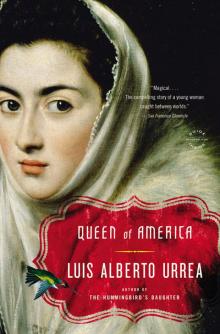- Home
- Luis Alberto Urrea
Into the Beautiful North Page 2
Into the Beautiful North Read online
Page 2
The American boys who started it all by making a peeved chibacall to their Mazatlán connection, seeking a key of gold bud, were on spring break from some college in California. They had wandered down the coast, looking for good surfing and party spots, and they’d made the error of picking the sugar-white beaches outside Tres Camarones for their camp. The locals could have told them—but didn’ t—that the picturesque beaches belied a brutal drop-off, and the waves hammered against a nearly vertical wall of underwater mud. Other hazards abounded. The nearest popular beach was called Caimanero because big alligators lurked in the foul freshwater swamps behind the shore—not a spot for frolic. Portuguese man-of-wars floated onto the beaches all summer, killing everything they could sting. There was a spoiling porpoise carcass on the sand to bear testimony to their powers. The safest salt water in that whole region was in the shallow turquoise lagoons where the women went crabbing with floating straw baskets full of scrabbling jaibas, the big crabs taking their last little sea cruise before landing in the cooking pot. But you couldn’t surf a tranquil lagoon.
It wasn’t like the people hadn’t seen Americanos. Tres Camarones had been beset by tides of missionaries from Southern California. But the Jesús Es Mi Fiel Amigo Sunday School and the End Times Templo Evangélico had finally closed down for lack of converts. The “youth center” went back to being a muffler shop that was also closed because its owner had gone to Florida to pick oranges. For a short while, an ashram run by a Wisconsin woman named Chrystal, who was in constant channeling-contact with the Venusian UFO-naut P’taak, rose north of town. Several local workers had made good wages working on Chrystal’s pink cement pyramid on her leased forty acres of scrub and pecan trees. But the local water cut short P’taak’s mission to the world, and Chrystal rushed back to Sheboygan with typhoid and amebic dysentery. After Chrystal’s personal rapture, the Jehovah’s Witnesses, known as Los Testigos de Jeová, were forced to leave town when the heroic local bowling champion, Aunt Irma, unleashed her devilish tongue upon them and christened them Los Testículos de Jeová. The Witnesses, deeply offended, packed up their Spanish editions of The Watchtower and abandoned the heathens to their grisly fate.
Scarface tossed aside his napkin. The lime juice and Cholula sauce were better when you sucked them off your fingers. The table was a wasteland of empty plates. He stood.
“Where are these pinches gringos!” he shouted.
The state cop checked his watch, put down his beer bottle, and turned to glare at Tacho as if the proprietor were the surfers’ secretary.
“We are busy men,” he warned.
“I’ve been here an hour!” Scarface complained.
Tacho shrugged.
“You know how Americans are,” he said. “Always late. On their own time.”
Scarface kicked back his chair and grabbed his gun. He held it down by his side, as if deciding whether Tacho and Nayeli needed shooting. “If the surfos show up, tell them next time we see them, they each get a bullet in the head. Understand? I don’t like to be kept waiting.”
“Sí, señor,” Nayeli replied.
The bad men strode out and got back into their car. Scarface pulled a fresh cinnamon toothpick out of his breast pocket. He took off the cellophane wrapper, dropped it on the floor, and popped the toothpick in his mouth. It waggled up and down. “Nice town,” he said. “No cops.”
He adjusted his lapels.
“No men, did you notice?”
He smiled.
“A vato like me could make a real killing here.”
He wiped his sunglasses on his shirt and put them back on.
“Watch yourselves,” he called out the window.
They drove away without paying.
Chapter Three
As the bandidos prowled the town and its outskirts, Tacho and Nayeli went about their day. Mopping the cement floor, sweeping the sidewalk in front, slicing limes, and peeling mangos. But mostly, they did what Mexicans in every small town in Mexico did: they circled their own history.
Nayeli was thinking about the missionaries. Well, she was thinking about one of them. The one saint—Missionary Matt.
All of Nayeli’s notorious girlfriends loved Missionary Matt. He was the first blond boy any of them had ever seen in person. They could claim that the vapid white-boy handsomeness of El Brad Pitt or El Estip McQueen at the cinema didn’t move them, but up close, it was a different story. A real live blue-eyed white boy was their own romantic freak show. Matt’s nose peeled. They had never seen a peeling nose. It was precious.
Matt sneaked away from his pastoral duties every night and crept into the Cine Pedro Infante. Nayeli’s girlfriends were not the only ones who sat in restless groups all around him, tittering over his slightest jest. Even mothers and aunties tittered, “¡Ay, Mateo!” whenever he said anything.
That boy was movie crazy.
Matt had endeared himself to the many girls in town by writing their names phonetically on four-by-six-inch cards. When he left, he left behind a hundred broken hearts as he distributed these well-thumbed cards to his sweethearts as farewell gifts, with his address and phone number written on the back of each.
The card was the closest thing to a love letter Nayeli had ever received. She pulled it out for inspection, the ink a little diffuse from her sweat. It read:
nah /YELL/ ee
Beneath this, it said:
Love, Matt!
Then an address and a phone number that started with an 858 prefix.
Love, Nayeli thought. She knew enough English to know that. Love. Was it love-love? Like, LOVE? Or was it just love, like mi-amigo-Mateo-love, like I love my sister or my puppy or peanut butter cups love?
“Hello?” Tacho said. “Work? Like, sometime today?”
“Oh, you,” she said dreamily.
Tacho raised his hands and seemed to beseech the universe.
Nayeli kept Missionary Matt’s card tucked in her kneesock along with the sole, tattered postcard her father had sent her from a place called KANKAKEE, ILLINOIS. It showed a wild turkey gazing with deep paranoia out of a row of cornstalks. Before he’d fled to KANKAKEE, Don Pepe had been the only police officer in Tres Camarones. Mostly, he directed traffic and inspected the rare car wreck on the eastern road. Nayeli’s father had been gone three years. When it really got hot, and she was sweaty enough to threaten the ink altogether, she reluctantly tucked the two cards into her mirror at home.
She wandered out on the sidewalk and swept listlessly. The scant heavy river breeze stirred her tiny skirt. Boys used to whistle at Nayeli when she went by, but she’d been noticing a silence in the streets. Perhaps nineteen was already too old. Everything was changing for her. There was nowhere for a champion futbolista to go if she was a girl. And it was out of the question for her to head off to Culiacán or somewhere else expensive to attend the university. Her mother took in laundry—but, really, all the old women of Tres Camarones took in laundry. It would take many more dirty and lazy people to sustain the home laundry industry. Fortunately, Nayeli and her mother received some assistance from the formidable Tía Irma—the future Municipal President. Tía Irma’s pro bowling winnings had been sufficiently vast that she had actually invested most of her money, and she was further comfortably attended to by monthly retirement checks from her hard years at the canneries. The checks were modest, but she didn’t need much more than Domino cigarettes, the occasional bottle of rum, and a steady diet of Tacho’s tacos and tortas.
It was Tía Irma, known to the notorious girlfriends as La Osa—the She-Bear—who had pushed Nayeli into fútbol. And it was both Irma and Don Pepe who had enrolled Nayeli in Dr. Matsuo Grey’s martial arts dojo when the other girls were taking dance lessons for the various pageants and balls at the Club de Leones. Karate, Tía Irma insisted, was good for the legs. Power on the field. But Nayeli was not fooled. To La Osa, life and love were war, and she expected Nayeli to win as many battles as possible.
Aunt Irma wanted her to beat up men.
<
br /> Missionary Matt had taught Nayeli a term for Tía Irma: Es muy hard-core, La Osa.
¡Ay, Mateo!” Nayeli said out loud. He was on some glorious California beach, and she was at Tacho’s.
It was a job, at least. It gave her money for shoes or movie tickets at the cine. Since Matt had donated his Satellite laptop to Tacho when he left, the taquería had been transformed into an Internet café.
Nayeli sashayed in and tossed the broom into the corner.
“I’m going on el Internet,” she announced.
“Do you think I pay you to play on the computer all day?” Tacho scolded.
“Yes.”
“¡Cabrona!”
Tacho was cranky like this with all the girls. It was part of his routine. A man like Tacho had to learn to survive in Mexico, and he had learned to re-create himself in bright colors, in large attitudes, thus becoming a cherished character. If you wanted to achieve immortality, or at least acceptance, in Tres Camarones, the best thing to do was become an amazing fixture. It was very macho to be a ne’ er-do-well, even if you were gay. That’s why mewling missionaries didn’t stand a chance. Being meek wasn’t macho. There was no legend there.
For years, the joke about Tacho’s “kind”—los jotos—was that they suffered from the affliction of “la mano caída.” The fallen hand, the cartoony limp wrist of the gay man in the common pantomime: just the phrase made people laugh. Except for Tacho. He didn’t accept being called “faggot” by anybody (except his girls), and he certainly didn’t feel that he was limp-wristed in any way. So he threw it back in their faces by naming his establishment the Fallen Hand. Genius! Even the most macho men in town had embraced him immediately, because he was wittier than they were, and because of this, somehow more macho.
That was years ago. Lately, the Mano Caída mostly attracted bored old ladies with very little money, or Nayeli’s troublesome bratty girls—and they never spent a peso. All they wanted to do was look at gringo boys on the Internet. He sighed. What a life.
At least he also sold women’s shoes from his back bedroom over on Avenida Benito Juárez. Nayeli wasn’t the only one who could work Mateo’s computer! Indeed, Tacho had found eBay, and he had begun his second career with the help of Tía Irma’s American Express card. Thanks to Tacho, Tres Camarones was now treated to a monthly visit from bright yellow DHL delivery trucks, an exotic touch that made the citizens feel cosmopolitan.
Tacho and Nayeli shared a lust for big cities—any big cities. They used the computer to spy on New York, London, Madrid, Paris. Sometimes, after work, they climbed on the roof of the restaurant to watch the bats. They made believe that clouds were the Manhattan skyline.
Oh no,” groaned Tacho, “here come the rest of them.”
The notorious girlfriends—what was left of them—were walking up the sidewalk. They were yelling, “¡Adios!” to everybody they knew on the street. People in Tres Camarones didn’t say hello, they said good-bye.
Nayeli looked out and grinned. There were only three of them left, but they liked to brag that they were the best of the bunch. Cuquis Cristerna had moved to Culiacán. Sachiko Uzeta Amano had gone to Mexico City to learn how to make movies. María de los Angeles Hernandez Osuna was studying to be a doctor in Guadalajara. Now it was just Nayeli, Yoloxochitl, and Verónica.
Yoloxochitl’s phonetic Missionary Matt card read:
YO-LOW / SO-sheet
He called her “Yo-Yo,” which amused him no end. Her parents had been infected with folklore mania, a real danger among liberal Mexicans with college educations. Her father had made it through one year of university, and thus well-connected to his Toltec past, he and Yoloxochitl’s mother had decided to christen their off-spring with Nahuatl names. Fortunately for everyone, they’d had only two children. Unfortunately for her older brother, they had named him Tlaloc. Young Tlaloc didn’t enjoy being known as the Rain God—every time he went to pee, his friends made relentless jokes—so he changed the name to Lalo before he went north with his father to become nameless.
Matt had already known how to say Verónica, but just to make her feel good, he’d made a card out for her, too.
ver-OH! / knee-kah
Lately Yoloxochitl had been working as a pin tender at the three-lane bowling alley down by the statue of Benito Juárez. Verónica worked as a shrimp peeler in the stinking estuaries north of town. Neither one liked her job. Too much sweat. Yoloxochitl wore her faded El Tri rocanrol T-shirt and some gaucho pants Tacho had sold her for half price. Her mother had saved for a year to get her out of glasses; her contact lenses had unleashed the fashion model inside her. She was carrying another one of her paperback books. Yolo—as the girls all called her—was always reading.
As usual, everybody was staring at Verónica, the only goth girl in Sinaloa. She had made her face pale with various ointments and creams, and she had painted her eyelids dark, her lips black, her nails black. She wore a long black skirt that must have been stifling, yet she managed to radiate cool air when she walked by. Verónica ironed her hair so it hung down like a sheet of satin. Her hair was already utterly black, but she also dyed it with Black No. 1 rinse just like her heroes in Type O Negative, whose videos she’d seen with Nayeli on YouTube.
It was much harder for girls to become astounding characters in the fabric of Tres Camarones culture—they were mostly, if they were eccentric, seen as outrageous monsters—but Verónica’s every public appearance was a shock.
She had been a goth for three months; before that, she had dreamed of being a pop star in revealing hot pants and see-through blouses of televised Latin American variety shows. She was going to dye her hair that plasticine coppery color that passed for blond among Mexican starlets. Only the notorious girlfriends noted that she’d gone goth after her father and mother had died.
Everyone called her La Vampira.
The girls burst through the door, popping gum and clanking bracelets.
“Tachito, mi flor!” trilled Yolo.
Normally, Tacho would flick anyone who called him a flower with his deadly washcloth.
“Tramp,” he replied, not meanly.
“Yolo!” Nayeli called.
“¿Qué onda, morra?” Yolo replied, delighting in street slang. Sounding like a city tough was so rocanrol. She was the best student among them—if she had been able to, she would have studied dentistry in college. She, too, was a soccer star, though Nayeli had overshadowed her on the field.
“Hola, Nayeli,” sighed La Vampira.
“Vampi!” Nayeli said. “How is life, Vampi?”
“Sad,” said La Vampira. She pulled a rosary from her black beaded clutch purse (Tacho’s fashion emporium, 155 pesos). The beads rattled on the table. “I don’t know how much more I can take.”
Yolo and Nayeli looked at each other and rolled their eyes. Tacho, a sucker for the goth routine, made up a small bowl of mango and pineapple and orange slices with red chile powder on them, and sat with La Vampira and poked toothpicks into the fruit.
“Eat,” he said. “You’ve got to eat, my angel.”
“Oh… Tacho…” she breathed. She squeezed his hand weakly. “She’s an angel?” muttered Nayeli. “Angel of death, maybe.” Yolo snorted.
“You snorted,” Nayeli said.
“I so did not snort.”
Nayeli clicked the keys and opened a video of a skateboarder getting hit in the crotch by his board on Google Video. She made a face and switched Web sites. Ah! Captain Jack Sparrow. Yolo leaned against Nayeli’s shoulder. She turned to La Vampi and said, “Oye, Vampi. La Nayeli is going to marry Johnny Depp.”
“Mmm, Capitán Yack Esparrow,” Vampi said.
“Oh, yes,” Tacho agreed. “Es muy caliente, el Capitán Yack.”
Verónica made a face.
“Me encanta,” Nayeli said. “I love him.”
“Me, too,” Tacho said.
“Yack Esparrow,” Vampi said, “needs a bath.”
She waved her hand dismissively.
“Besides,” she added, “I can only marry one man.”
“Not again,” muttered Nayeli.
She grumbled and went to YouTube. Verónica had never even seen “gothic” people before she had watched Nayeli work Tacho’s computer, but as soon as she saw wan boys in mascara, she was lost. Type O Negative was awesome, or “chido,” as she put it. The Sisters of Mercy put her way around the bend. And now this. Nayeli huffed, then typed in “The 69 Eyes.” Thinking: Why do I do this?
“What does that mean?” Tacho asked.
“He must have sixty-nine eyes,” Yolo said.
“Who does?”
“Him,” said Nayeli, pointing to the goth band on the screen, and at the cadaver sitting in their midst.
“He always wears sunglasses,” Vampi marveled. “His name is Jyrki.”
“The glasses hide all those eyeballs,” Yolo said.
“¿Qué?” asked Tacho.
“Here we go,” Nayeli said, mouse clicking to call up Vampi’s favorite song, “Gothic Girl.”
The girls started to dance. Tacho thought this Jyrki person sounded like he was dead, but he sounded comfortable being a corpse, even happy.
“Dance with me, boy,” Nayeli commanded.
Tacho took Nayeli’s hand and tried a cumbia to the music. La Vampi went crazy and started jumping up and down, bobbing her head from side to side. In her heavily accented English, she sang, “I love my gothic girl!” Well, what she said was: “Ay lob myng goddig gorrl.” And everyone laughed.

 Queen of America
Queen of America The Water Museum
The Water Museum The House of Broken Angels
The House of Broken Angels The Devil's Highway: A True Story
The Devil's Highway: A True Story Tijuana Book of the Dead
Tijuana Book of the Dead Into the Beautiful North
Into the Beautiful North